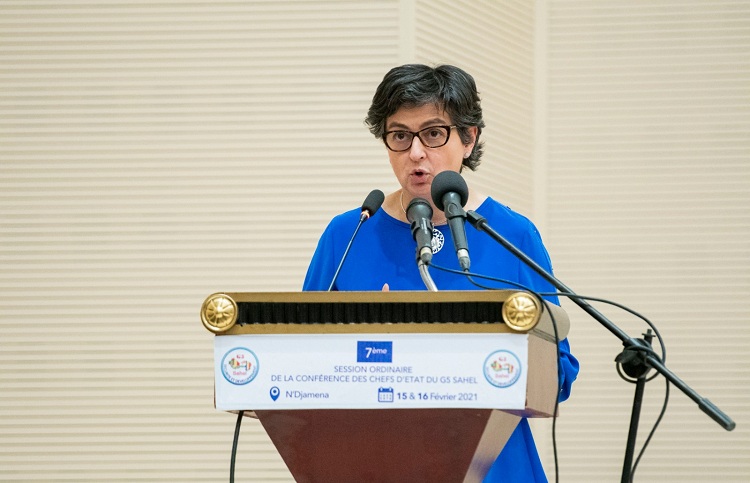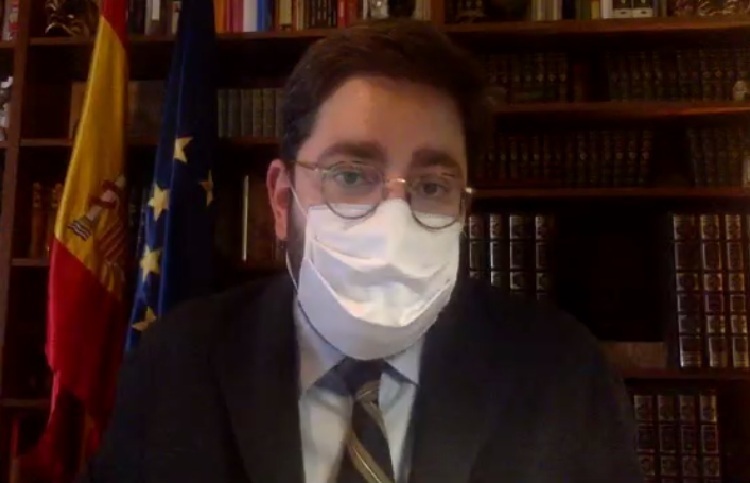The Diplomat
The Minister of Foreign Affairs, Arancha Gonzalez Laya, urged yesterday the countries of the G5 Sahel and the Sahel Alliance to concentrate their efforts in favor of the “most vulnerable” areas and sectors and to support the response of the governments of the region to “the health, economic and social challenges caused by the COVID-19 pandemic”.
González Laya participated yesterday, in her capacity as rotating president, in the General Assembly of the Sahel Alliance, which was held in the Chadian capital, N’Djamena, on the sidelines of the seventh ordinary session of the Conference of Heads of State of Burkina Faso, Chad, Mali, Mauritania and Niger (G5). The meeting concluded with the adoption of a Joint Declaration in which the members of the Alliance reaffirmed their commitment to the priorities of the G5 Sahel to achieve a lasting improvement in the living conditions of the populations of the region and called for the deployment of the State in the most fragile areas to restore security and ensure the provision of public services to the population.
The Sahel Alliance, the body that coordinates development funds going to the G5 countries, was created in July 2017 by France, Germany and the EU, together with the African Development Bank and the United Nations Development Program (UNDP). It has since been joined by Italy, Spain, Luxembourg, the United Kingdom, the Netherlands, Denmark, Norway and Ireland. Gonzalez Laya assumed the chairmanship of the Sahel Partnership General Assembly on June 24, 2020. The Alliance currently brings together 25 bilateral and multilateral partners, 14 as full members and 11 as observers.
During her speech, the head of Spanish diplomacy highlighted the “achievements” made by the partnership between the G5 Sahel countries and the Sahel Alliance, which have led to “concrete and tangible results“, especially in terms of access to essential services, results that “demonstrate a growing commitment and more effective modalities of intervention by Alliance members”. “Since its launch in 2017, the number of projects funded has doubled, as have financial commitments (from €7.3 billion to €16.9 billion) and amounts disbursed”, she assured.
Despite this, she warned, crises persist and vulnerabilities continue to worsen in some regions, so he called on G5 governments, supported by Alliance members, to do “more and better”. “We reaffirm our commitment to increase co-financing and joint projects, to prioritize flexible and simplified implementation procedures, and to reduce the transaction costs of our interventions for our partners”, she said.
She also recommended intensifying dialogue with the G5 Sahel and its member states, through “regular contacts at the highest level”, and increasing coordination and concentration of efforts in vulnerable areas through local development plans that have “adequate operational procedures and measurable indicators of success”, a task in which, she warned, “it will be necessary to ensure the full participation of local authorities and territorial administrations”.
She also urged support for “the presence, deployment and maintenance of the State and public services in the territories of the G5 Sahel countries, focusing on the provision of essential services, the strengthening of the resilience of vulnerable populations, in particular youth, women and the disabled, and restoring and consolidating social cohesion and citizens’ trust in their public institutions”, and invited Alliance members to “support the response of the Sahel G5 countries to the health, economic and social challenges caused by the COVID-19 pandemic”.
Afterwards, González Laya delivered a speech, in her capacity as President of the Sahel Alliance Assembly, to the Heads of State gathered at the G5 Sahel Summit, one year after becoming the first representative of the Spanish Government to speak at this Summit – on that occasion she did so in Nouackchott. She also visited the Notre Dame des Apôtres Hospital in N’Djamena and met with the President of the Malian Transition, Bah N’Daw, to whom she expressed Spain’s willingness to contribute to stability in the Sahel region and with whom she discussed the progress of the political process in that country. Spain participates in the Support and Monitoring Group for the Transition in Mali.







